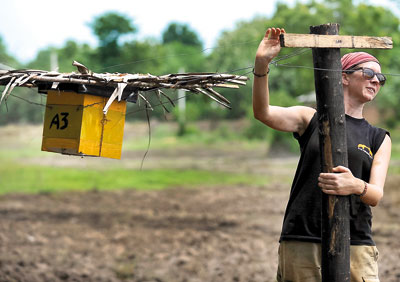Hello bees, goodbye elephants
For many villagers in Wasgamuwa, elephant attacks are a daily threat. The people have to rely on luck to be safe from the marauding jumbos who roam around their villages, especially during crop seasons. But that may change. Kylie Butler, 34, a PhD student from the University of Newcastle is trying out a new way of keeping the elephants away.

Kylie: On a mission to ease human elephant conflict.

A young mother checks the contraption in her garden
By harvesting bees, instead of electric fences, she proposes to put up beehive fences around the houses to keep the elephants at bay. A method tried and tested on African elephants in 2008 by Dr. Lucy King, University of Newcastle, who is also Butler’s supervisor.
“I was involved in Dr. King’s PhD Project in Kenya. This is where I got the idea. It is successful in Kenya, against the African elephants. This is the first time such a project is being implemented formally in Sri Lanka and in the Asian region. So we need to test how Asian elephants would react to the method,” she explained.
In Kenya, elephant-friendly bee honey has become a social enterprise and generates additional income for the villagers who harvest bees.
Wasgamuwa, Dewagiriya, about 250km from Colombo where elephant attacks are a constant danger has been selected for the pilot project. Ten houses in the village have put up protective beehive fences.
“Kenya is rather dry but Wasgamuwa does not have such a dry climate, so I think the conditions would be ideal for the project,” says Ms. Butler.
“When elephants attack villagers and destroy their homes and farms, the people shoot at them, shout at them. The elephants become more aggressive towards the people. We have observed many elephants with gunshot wounds as well. Shooting elephants has become the norm for the

A majestic jumbo with a gunshot injury in the area
people in their struggles.
People still have to co-exist with these animals. Hopefully this will change that.”

Happy with the project: Priyadarshani with her child
As she doesn’t speak the local language Butler has problems communicating with the villagers but members of the Sri Lanka Wild Life Conservation Society have been assisting her in her efforts to raise awareness among the community.
“Elephant attacks are rampant during paddy cultivating seasons and the harvesting seasons. Even recently my neighbour was killed by an elephant. We don’t have an electric fence to keep elephants away. We like this project as it helps us,” says Rasika Priyadarshani, a 23-year-old mother of one, who lives in fear daily of elephant attacks.
U. G. Sobana (65) who has grappled with the issue all his life appreciates Ms. Butler’s efforts.
“This madam is installing beehive fences to prevent elephants from attacking us. This will help us as we don’t have an electric fence to keep elephants away. I think it will work. This will also help us make extra income by selling bees’ honey. We already have 17 beehives around our house.”


